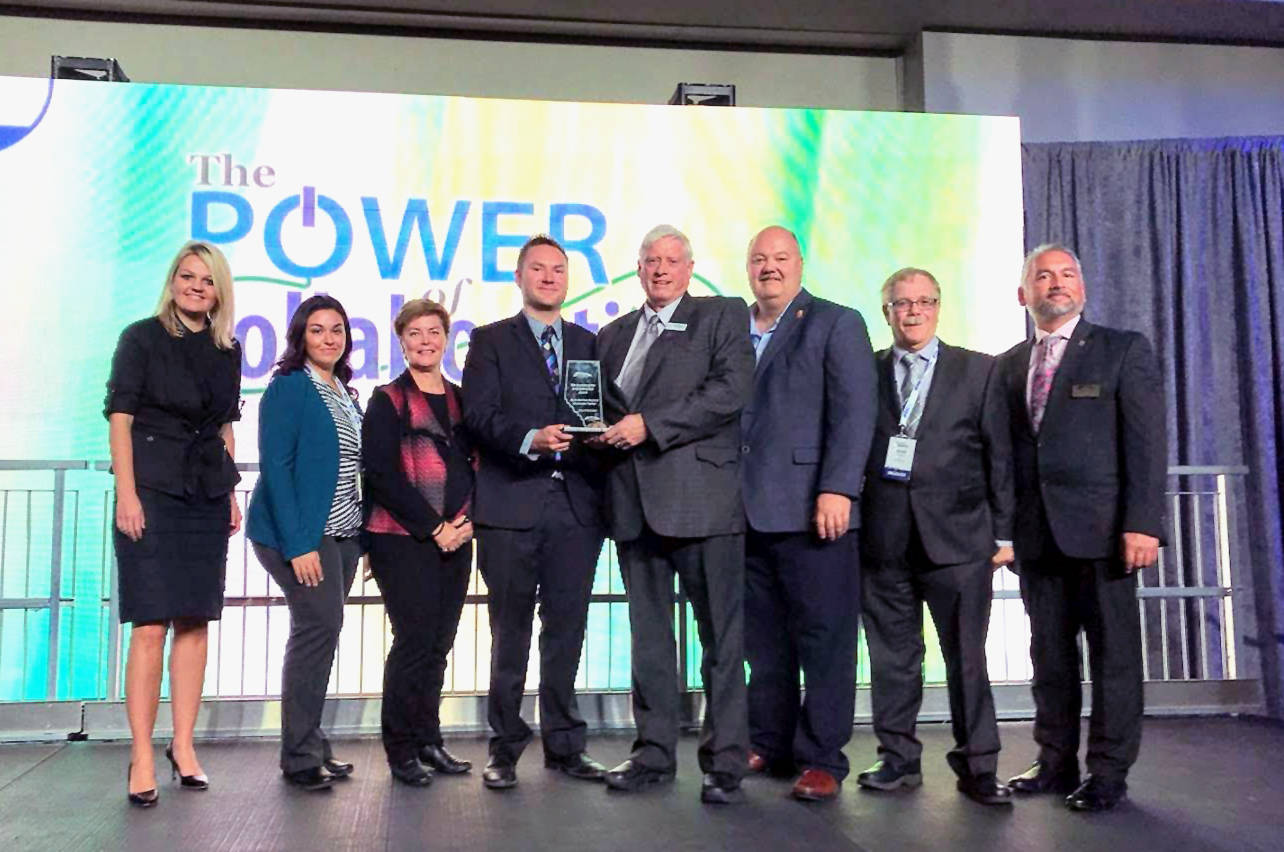The City of Lacombe, Town of Blackfalds, Lacombe County and the City of Red Deer are pleased to be the recipients of the Alberta Urban Municipalities Association’s (AUMA) 2018 Sustainability in Collaboration Award.
The award recognizes AUMA member municipalities that have demonstrated excellence in implementing sustainability plans and achieving measurable outcomes related to environmental sustainability. It was presented Sept. 26th at the AUMA Convention at Westerner Park in Red Deer.
The four communities were selected for recognition based on the success of the North Red Deer Regional Wastewater System project, an inter-municipal initiative to address water quality in the Red Deer River, and to support the continued growth and sustainability of the Central Alberta region.
Lacombe Mayor and North Red Deer Regional Wastewater Services Commission (NRDRWWSC) Vice Chair Grant Creasey was pleased to accept the AUMA award.
“The City of Lacombe is pleased to be recognized alongside our regional partners for the North Red Deer Regional Wastewater System,” he said. “This critical infrastructure project ensures long-term environmental sustainability for the region and a consistent, valued service to area residents.”
The project involved the construction of a 28-kilometre wastewater pipeline, along with associated infrastructure, to connect the member communities of the NRDRWWSC – Lacombe, Blackfalds and Lacombe County – to the regional wastewater treatment facility in Red Deer. The system returns wastewater to the same basin from which it was drawn after treating it to an exceptionally high environmental standard.
Ken Wigmore, NRDRWWSC Chair, accepted the award on behalf of Lacombe County.
“On behalf of the member municipalities of the North Red Deer Regional Wastewater Services Commission, I am honoured to receive the AUMA’s 2018 Sustainability in Collaboration Award,” he said. “This award speaks to the great ongoing working relationships that our communities enjoy.
“This project was the largest capital project in the Central Alberta region for some time, and it will continue to benefit area residents well into the future.”
“Lacombe County is proud to have played a role in the NRDRWSC project,” Lacombe County Reeve Paula Law added. “By working together we were able to support growth to this region and proved that we can create so much more when we work together.”
This high-priority infrastructure project yielded immediate economic benefits to the area in terms of employment during construction, and provides for needed long-term sustainability in addressing the region’s critical wastewater needs.
Matthew Goudy, CAO of the NRDRWWSC was pleased to receive the award.
“It is exciting, but not surprising, that the Central Alberta region has been recognized for dedication to collaboration and sustainability,” he said. “The City of Lacombe and our partner municipalities have a long, successful history of working together to make great things happen.”
Blackfalds waa also pleased to be part of the extensive municipal collaboration on this project.
“The Town of Blackfalds is excited to be recognized, with our partners, for this award,” Bayor Richard Poole, Town of Blackfalds and NRDRWWSC Director, said. “This program was a combined effort and it truly shows the spirit of collaboration that allows our region to be one of the most progressive in, not just our province, but our country.
“It is a testament to our staff and their collective visionary approach with our partners to bring this project forward for our residents.”
Mayor Tara Veer of the City of Red Deer spoke about the sustainability of the project.
“The City and our municipal counterparts appreciate that the partnership between our Central Alberta communities is being recognized with an AUMA Sustainability in Collaboration Award,” she said. “The North Red Deer Regional Waste Water project is a demonstration of Red Deer and the region’s long-term commitment and leadership to improved environmentally sustainable and financially efficient practices to protect the Red Deer River and watershed as a whole.”
-Submitted by the City of Lacombe



